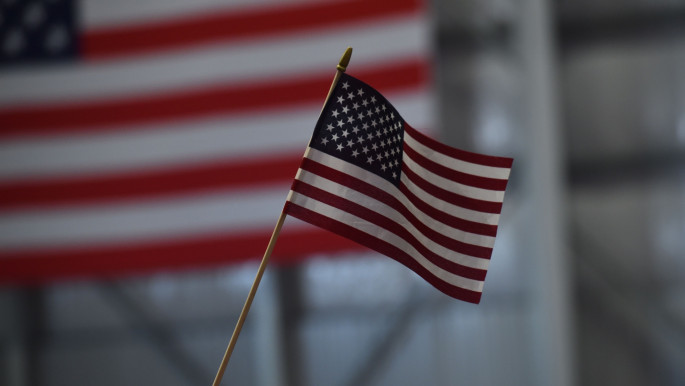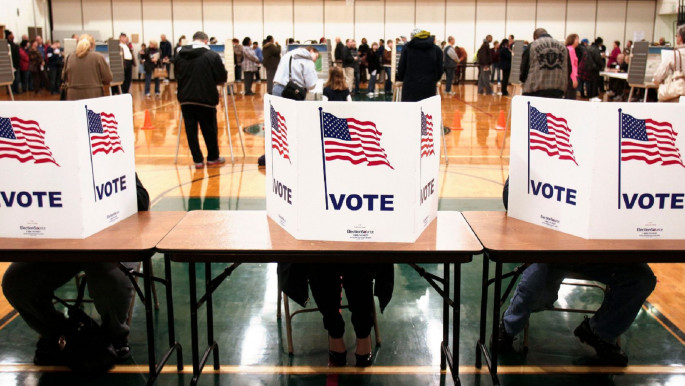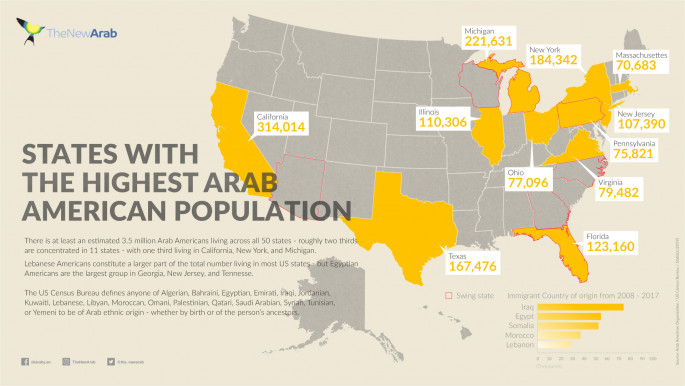The Arab and Muslim candidates fighting to transform American politics
When Abdullah Hammoud first ran for the Michigan House of Representatives, some people suggested he change his name. But as far as he was concerned, "Abdullah is as American as any name." He's now on the ballot for his third term.
After he won his race, his much bigger challenge began: winning over voters and politicians from the other side of the aisle in Michigan, a notoriously politically mixed state that's home to America's biggest Arab and Muslim communities that tend to lean Democratic, while vast rural areas are staunchly Republican, and many parts of the state are a mix of both parties.
Having grown up in this political climate, Hamoud adamantly believes, "It doesn't matter how smart you are. What matters are the relationships you build."
After working in healthcare, he started his political career with Republicans who didn't want to work with Muslims, Democrats who were unwilling to champion issues, lobbyists who thought they couldn't discuss alcohol, and a fellow politician who thought Hammoud had a sharia law handbook.
 |
There are over a hundred Arab and Muslim candidates across the country in local races this election |  |
At the beginning of his first term, he took 60 state legislators to Altar Street in Dearborn, with the largest mosque in North America alongside three churches, and offered to answer any questions they had. He made cross-party diplomacy a weekly ritual by playing basketball every Thursday morning before session with the Republican speaker of the house, whom he worked with to pass legislation on healthcare.
Local politics are where some of the most important decisions are made – from roads to sewage to schools. It's also where some of the biggest inroads are being made by Arab and Muslim candidates. Encouraged by their friends, neighbours and NGOs, their growing numbers are found coast to coast. Organisations like Emgage and the Council on American-Islamic relations (CAIR) have endorsed promising Muslim candidates, while Jetpac actually trains about 20 per year.
 |
|
| 'The stakes are high': Meet the Arab American volunteers rallying swing state voters for Biden |
"If you want to make voting part of the norm, you have to start with local elections," says Wa'el Alzayat, CEO of Emgage, a Muslim civic engagement organisation, noting that Muslim voter turnout doubled between 2014 and 2018. He's also predicting a high turnout for 2020, which could have an important impact on swing states, such as Michigan, Florida, Pennsylvania and Virginia.
Like swing states at the national level, local races are often won and lost by small margins – something new candidates learn quickly as they edge their way into unfamiliar and often inhospitable territory, knocking on doors and fundraising from scratch.
Mo Seifeldein, who at age 11 arrived with his family in Virginia as refugees from Sudan, decided to run for city council in Alexandria in 2018, instigated by some of Trump's harsh policies, such as the Muslim travel ban. His first obstacle was a member of his own Democratic Party, a former elected official, who took him aside and asked him to drop out of the race. He then had to compete with candidates who outraised him by more than tenfold - $125,000 to his $10,000. It was his diligent door-knocking that gave him the connections he needed to win over voters.
"Being a newcomer with no name, even in a blue area, they might welcome you, but not at the table," Seifeldein recalls of his initial challenges of entering the race as a newcomer, a minority and as a progressive candidate who refused corporate campaign donations. "There was active opposition against me. That was heartbreaking, but that's politics."
 |
Local politics are where some of the most important decisions are made. It's also where some of the biggest inroads are being made by Arab and Muslim candidates |  |
On the other hand, he says, "Some people who were politically astute knew my potential. There's a new generation of leaders rising. They respect the party, but they're also pushing the party to live by its principles." Through his grassroots campaigning, he also has managed to earn the respect of voters who disagree with him.
"When I was knocking on doors. There were people who didn't agree with me, but they said it was refreshing to hear a politician not pandering. Even after I became a council member, some of them emailed me and said they appreciated me asking tough questions," says Seifeldein, whose early childhood during the war in Sudan instilled in him values of justice and democracy, which he saw erode over time, something he is working to prevent in his adopted country.
 |
|
| Explainer: Why is the Arab American vote so important in the 2020 US election? |
He sees public service in America as a way to give back to his adopted country. Prior to entering the race, he worked as a court-appointed attorney.
For Sam Hindi, a council member on the ballot in Foster City, located in the heart of Silicon Valley, where he initially moved to expand his small business, his entry into politics was gradual, as he went from one civic volunteer position to another, until he was asked to run, and was elected in 2015. His upbringing as a Palestinian in Lebanon during the civil war has informed his politics.
 |
My experience of being discriminated against and seeing injustice shaped who I am and made me someone who wants to fight more for justice |  |
"My experience of being discriminated against and seeing injustice shaped who I am and made me someone who wants to fight more for justice. For me, you have to fight for justice everywhere. I learned that from my childhood experience," he says, tying his international perspective with his passion for local engagement.
"Local politics are extremely important because it impacts people's lives and quality of life. That's why people choose to live in communities. I like this kind of work at the local level. You're in touch on a daily basis with constituents. You know what they like and don't like. You see the impact right away," says Hindi, who is pleased to see what he believes is a shift leftward in the Democratic Party base on domestic issues, such as healthcare, as well as foreign policy, like Palestinian human rights.
Ahmad Zahra, a doctor and filmmaker, who grew up in the United Kingdom and Syria, also got involved in local politics to make an impact in his local community. In his case, he was elected to the city council in the most disadvantaged district of Fullerton, literally separated from the more affluent area by railroad tracks, in Orange County, California, much more known more for its wealth.
In fact, he says his district is 90 percent disadvantaged, and even though it is majority Hispanic, he believes he can relate to their struggles and advocate for them because of his immigrant experience.
"It's an immigrant's journey coming in. it gives me the ability to relate to the community. I didn't run because I'm Arab. I ran because of the economic situation in the city," says Zahra, who has focused on housing access, child poverty and water rights since taking office in 2018.
On the other hand, he says, "I'm proud that someone named Ahmad Zahra can come in and advocate for the community. In order for us to succeed as Arab Americans, we need to think of ourselves as Americans first. Even people who hate me can spell my name now." He adds that he's proud to be the first Syrian elected in Orange County, the first openly gay politician in Fullerton and the first openly gay Muslim to be elected in the United States.
 |
Local politics are extremely important because it impacts people's lives |  |
Mariam Aboudamous, a full-time lawyer who serves in the part-time position as city council member for the town of American Canyon in Napa County, is also one of the few Arabs in her area. She ran for office to give back to her local community. It wasn't until after she was elected, and people started reaching out to her, that she realised she had become a role model for other Palestinians.
 |
|
| Click to enlarge |
It wasn't long before she ran into barriers. She wanted to make a proclamation for her town to recognise the month of Ramadan, just as heritage month for Filipinos is recognised. It was blocked. Instead, she hosted an iftar meal for 120 people. The following year, the town ended up doing a proclamation for Ramadan.
"It shows you there's a huge lack of awareness of the Muslim community," says Aboudamous, who now has to cap her annual iftar guest list at 150.
No doubt, it has not been easy for these politicians to break new ground. But they are confident they are turning a new page in history.
Seifeldein says, "George Washington served as a trustee in Alexandria, which is now the council. This is also telling the story of how far our nation has come. George Washington was a slave owner, and now an African Muslim immigrant is holding office."
Brooke Anderson is a freelance journalist covering international politics, business and culture
Follow her on Twitter: @Brookethenews





 Follow the Middle East's top stories in English at The New Arab on Google News
Follow the Middle East's top stories in English at The New Arab on Google News


